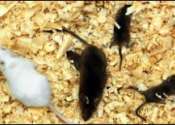Study stops vision loss in late-stage canine X-linked retinitis pigmentosa
Three years ago, a team from the University of Pennsylvania announced that they had cured X-linked retinitis pigmentosa, a blinding retinal disease, in dogs. Now they've shown that they can cure the canine disease over the ...
Oct 12, 2015
0
188







